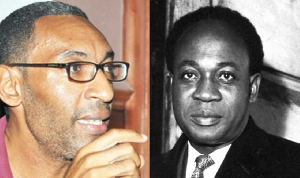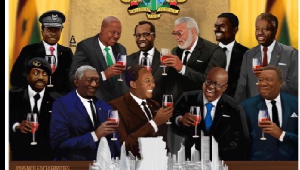For Danquah, the primal revolutionary act is the massive and effective eradication of illiteracy as an indispensable means to ensuring national development. Thus in ?Friendship And Empire?(1949), the putative Doyen of Gold Coast and Ghanaian politics lauds the extant British Secretary of State for the Colonies, Sir Creech Jones, for outlining an illiteracy eradication policy: ?To-day, the Secretary of State in outlining a policy to smash illiteracy, to offer wider protection for the helpless, and to train youth for the responsibilities of life, assures us that: ?It is work which can only be achieved in collaboration with the people, and with their full cooperation. It is,? he emphasizes, ?their society which is being affected by the changes. It is not our (British) policy to possess and impose. It is no less true to-day that, for sound government, the rights of the native peoples must be fully respected and their understanding, active interest, and goodwill secured. We must respect the dignity and personality of the people we work with, giving our service with no feeling of superiority, but convincing them of the integrity of our purpose and winning their confidence by the disinterestedness of our service.?/ Words which may be carried to heaven by golden angels on golden wings and inscribed in Heaven?s golden book. How may these words, lifted from the catechism of the Golden Rule, be translated on this earth, this lower plane [of existence], into action, so as to bring happiness to the peoples they are intended to delight??(9).
In sum, for Danquah, while a comprehensive and progressive agenda for the modernization and development of continental Africa in general, but Ghana in particular, could scarcely be gainsaid, the functional operationability of such a salutary agenda was even more indispensable. In essence, the Doyen was an uncompromising pragmatist who could not be readily, or easily, hoodwinked with political pretenses. Equally uncompromising, it is significant to observe, was Danquah?s understanding of the necessity for the proverbial African personality not to be summarily sacrificed on the altar of a British-led modernizational process: ?By genuine local government the Colonial Office refer[s] to something modeled on English local government patterns. They make no secret of their desire to see the executive of African local governments pass from the hands of traditional authorities into the hands of elected representatives of the people?(?Friendship And Empire? 10). And perfectly within the bounds of his well-known forthright and untemporizing principles, the Doyen ripostes: ?To my mind, if socialism [of the sort championed by extant British Prime Minister Clement Richard Attlee (1945-51) is] to be a success, the new dynamic Gold Coast spirit ? call it nationalism if you will ? must recognize it as a duty to ensure that the application of the English local system to our Gold Coast way of life, to our own inherited non-feudal democracy, should not destroy but fulfill our democracy of chieftaincy?(?Friendship And Empire? 11).
The Doyen obliquely delineates the traditional Ghanaian system of democracy, whereby familial and clan(al) representatives assemble to form the town or municipal government, with representatives from the latter also being, in turn, elected or appointed to collaborate with other similarly appointed or elected representatives to duly constitute the statal or national government within a traditional polity. Consequently, the foremost Ghanaian constitutional expert of the twentieth century is quick to observe that the British colonial government?s attempt to effecting a radical paradigm shift away from traditional Ghanaian system of governance merely amounted to literally pouring a bucket of water into a sieve: ?There was also a suggestion [at the meeting of the first African Conference of Legislative Councilors] that membership of the central legislative assembly should be elected by the local government authority. That is to say, instead of applying the approved and well-tried principle of manhood suffrage to the new colonial parliaments, a system of indirect election is recommended, colonial members of parliament to be elected by colonial country councils, or, as in the Gold Coast, by the territorial councils. It was pointed out that such a practice would be tantamount to setting up the supreme legislative assembly as merely a grandiose sub-committee of the joint territorial councils?(10).
For the founding leader of the United Gold Coast Convention, perhaps, the single greatest achievement of the 1948 Conference of African Legislative Councilors (CALC) was the highlighting of the imperative need to overhauling the prevailing medical policy of the colonial regime. For his part, Danquah called for the shift in emphasis from one of Curative Medicine to a more cost-effective and salutary policy of Preventive Medicine: ?Then, says the new Colonial Office policy, the best plan is to remove the root cause. Instead of waiting for the patient to contract the disease, go to his village and clear away the debris of appalling living conditions which gave cause to the disease. Prevent the disease from attacking the hopeless and helpless citizen. If he lacks good water, give him good water. If his food is deficient, make it efficient. If he sleeps in a damp bed, or no bed at all, give him better living and sleeping accommodation. And so on and so forth./ In other words, in place of antiquated curative medicine, which is not now the rule in England but is the rule in the Gold Coast, there is to be imposed a system of preventive medicine where the doctor and the nurse and the sanitary inspector and the dispenser will take, not medicine, but health, to the people, or, at least, the conditions of health?(?Friendship And Empire? 12).
Needless to say, Danquah is more than sophisticated enough, once again, to readily decipher between a purely pontifical policy rhetoric in the heat of a political convocation and an already emplaced, operational or institutionalized policy agenda. And what is more the Doyen, all too eerily, recognizes the daunting fact that Sir Creech Jones, the British Secretary of State for the Colonies, prioritizes his country?s imperialist interests over all else, including, of course, the exigent need for the rapid and massive socioeconomic, cultural and technological development of Britain?s African colonies. To this end, the author of ?Friendship And Empire? cautions against inordinate pussyfooting on the part of the Colonial Office: ?And don?t tell me the money is not there. The African Conference was informed categorically that the money for Colonial Welfare and Development is there. And apart from that munificent gift from England, we know ourselves that we have the money here in the Gold Coast. Ten years ago, if any one had told the Gold Coast Government to spend 5,000,000[pounds sterling] in order to secure healthy conditions of growth for the cocoa industry[,] the Government would have turned down the proposition as a maddening dream. To-day the Gold Coast Government are begging us, the chiefs and people, to beg the cocoa farmers to allow the Gold Coast Government to spend not five but nine millions sterling to cure cocoa disease?(?Friendship And Empire? 13).
Earlier, Danquah warns the largely self-centered colonial regime against the adoption of half-hearted measures, vis-?-vis the effective and massive promotion of preventive medicine: ?It calls for the training of a large number of doctors and doctors? helpers. It calls for a bold and imaginative conception on the part of our Government to drop the niggardly policy of three or five medical scholarships a year, and send out not scholars who may be counted on both hands, or on both hands and toes, but in droves, fifty or more at a time. Don?t tell me the men are not there. King George V Memorial Hall itself isn?t too big for the hundreds of eager students who are seeking to pass the Cambridge Examination. This great foundation, this Gold Coast University College, is not itself large enough to contain all the promising students who would enter its portals for graduation?(?Friendship And Empire? 13). Furthermore, in terms of his ideological stance towards cultural and educational development, Danquah may be aptly labeled an ?Aggreyist?: ?Aggrey, in one of his inspiring expressions of sentiment, said: ?You educate a boy and you educate an individual. You educate a girl and you educate a nation.? Don?t say it is not true in reality. Say we would like to try it, have as many girls in our Gold Coast University as there are boys. You can?t be free and completely intellectual if the women around you, by nature the most conservative bearers of custom and tradition, are not also free and intellectual. They tend to drag you down?(14).
But, perhaps, even more significantly, it bears eloquent profundity to observe that for Danquah the ideology of ?Socialism? primarily meant ?canaille-friendly? policies or the classical or ideal concept of the ?Welfare State,? rather than the belligerent and societally alienating concept of ?class struggle,? as propounded and propagated by Karl Marx and Friedrich Engels and fanatically and pontifically pursued and chaperoned by Kwame Nkrumah. For the Doyen of Gold Coast and Ghanaian politics, tersely defined, ?Socialism? is the liberal provision of ?Higher education, technical education, mass education, more senior schools and not less junior schools, these, together with the need for a greater extension of facilities for our womenfolk from the dungeon of custom to the freedom of enlightenment, were accepted and endorsed by the African Conference [i.e. CALC] as urgent and vitally immediate targets if socialism in the colonies is to come in our time. And it must come?(?Friendship And Empire? 14).
In essence, the mature and ever cautious thinker in Danquah immutably, insistently and consistently counseled against Soviet-style Socialism, which the Doyen aptly deemed to be patently inoperable in Ghana. Needless to say, the subsequently massive failure of Nkrumah?s Soviet plantation-style Workers? Brigade attests to the unimpeachable foresight of Danquah, far and away the most astute theorist and thinker on twentieth-century Ghanaian traditional culture and politics. Regarding Soviet-style agricultural revolution, the Doyen critically but politely and firmly observes: ?This is a vast subject. So vast that the Colonial Office had to traverse the vast expanse of the continent of Europe to land us in Russia for a correct appreciation of the ideas the Colonial Office [under the socialist prime ministerialship of Clement Richard Attlee] have in mind to improve our agricultural production. And the Russians have achieved marvelous results. They did it by compulsion. And so it was easy to level down conservative opposition. The British way of life is democratic, not compulsive, and we are called upon to achieve by persuasion and discussion what was done in Russia by compulsion./ Three proposals for improving our agricultural production were placed before the Conference: (1) wealthy persons and corporations to take up agriculture on a large scale, using some of the peasant farmers as workers in plantations; (2) cooperative agriculture, with members cooperating in tilling the soil and planting and reaping with machinery obtained by the funds of the cooperation; and (3) collective farming such as is visualized in the groundnut scheme. It goes without saying that the Gold Coast delegation rejected the first of these proposals, the plantation system. We of the Gold Coast delegation agreed to take home with us for trial cooperative and collective agriculture. Our problem in the Gold Coast is embedded in our history. By means of peasant proprietorship the Gold Coast farmer was able to achieve the romance of the cocoa industry. Would the highly individualistic character of the Gold Coast farmer permit him to indulge in collectivization? We should not hasten to answer the question. Experience is not the only pebble on the beach?(?Friendship And Empire? 15).
In other words, for Danquah, while it is virtually a foregone conclusion that Soviet-style agrarian culture, having no historical affinity with the erstwhile Gold Coast, is highly unlikely to succeed hereabouts, the fact still remains sound and valid that human adaptability invariably and infinitely is wont to making reasonable and ample room for novel ideas and techniques. Ultimately, even while making room for the ideological practice of Socialism in Africa, particularly Ghana, Danquah, nevertheless, is quick to point out that at the least the democratic spirit of the indigenous African bespeaks of a non-negotiable coupling of Socialism with Democracy, in effect the salutary forging of Democratic Socialism or Socialist Democracy: ?It is a great opportunity for Africa, and for us in the Gold Coast in particular, not indeed to bargain like a demented Shylock [or a pathological capitalist] for our pound of flesh, but to impress the United Kingdom Government that since only the best is good enough for Africa, if socialism, with all that it implies, is good enough for Britain, it must be good enough for the Gold Coast./ And mark my words, socialism without democracy ? free government, a government authorized by the people and governing in the name of the people, and, what is more important, for the people ? democracy without representative institutions, is a sham?(?Friendship And Empire? 17).

Views expressed by the author(s) do not necessarily reflect those of GhanaHomePage.














